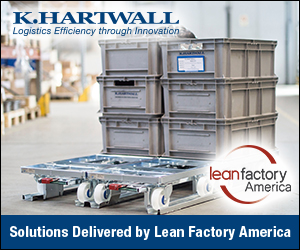What companies have traditionally relied on to improve performance—process optimization, cost reduction and predictability—are no longer delivering what’s needed to maintain market share and grow new customers, according to a new report by Accenture and HfS Research. The report identifies digital disruption, data explosion and customer experience as the driving forces behind the need for companies to transform how they do business.
|
Members of the U.S. alpine ski team are using VR to train for their Olympic runs. The VR course allows them to react to different conditions and speeds, allowing them to create competitive reflexes—which can make the difference in sports where tenths of a second matter. Similar technology is being used to train forklift drivers for work in material handling.
|
It is all speed ahead on MODEX 2018 this April in Atlanta. To start prepping, we’re going to tease some of the educational things that will be happening at MODEX 2018. First? Keynotes.
|
Organizations are beginning to see reverse logistics as an untapped source of revenue, and a vehicle for driving increased sustainability goals. In this video, Amy Augustine, senior manager of reverse logistics at U.S Cellular claims the C-level has now realized there is a big source of money in the products being returned.
|


When it comes to eCommerce fulfillment, it’s all about location, location, location. And that location must deliver speed and agility. That’s why more and more retailers are augmenting their traditional larger distribution centers with "pop-up locations"—which can more quickly serve particular growing markets and urban areas.
|
Amazon has applied for a patent for an autonomous ground vehicle that picks up your packages. In this patent, "Autonomous ground vehicles (AGVs) are utilized to retrieve items from transportation vehicles (e.g., delivery trucks) for delivery to specified locations (e.g., user residences, etc.)." The idea is much like a neighborhood dog that goes to fetch the paper however, in this case, it’s a neighborhood robot.
|
February means we’re less than two months out from MODEX 2018, so we’re going to be working hard to keep you informed about all the stuff you can do and see at MODEX. Because there’s a lot, including tours of several Atlanta supply chain facilities.
|
There are many reasons to be optimistic about growth in the year ahead. Data in the latter half of 2017 were generally positive, the International Monetary Fund (IMF) raised its global growth forecasts, and leading indicators—like global purchasing manager indices—were indicative of future growth. There is only one major downside risk, and it’s a big one: U.S. fiscal policy disappointment.
|
At MODEX 2018 you’ll have the chance to learn from five keynotes on leading supply chain topics. Among these keynotes, George W. Prest, CEO of MHI, and Scott Sopher, Principal, Deloitte Consulting LLP’s Supply Chain practice, will share insights from the 2018 MHI Annual Industry Report.
|
Tech start-up Embark recently sent a self-driving truck on a southern coast-to-coast journey from Los Angeles to Jacksonville, FL. The automation software on the truck did most of the highway driving, but a driver was behind the wheel at all times ready to take over if needed. This is considered Level 2 automation, but is an important step toward Level 4 automation, where the truck will drive a specific highway route with no driver.
|


New technologies can be a great benefit for supply chain firms, but if the transition to isn’t handled correctly it can easily turn into a headache. In this video, Dr. Randy Bradley of the University of Tennessee shares some tips on how best to effectively guide your organization through the process of enacting major change.
|
Imagine if the next time you request a ride on your phone, a driverless vehicle pulls up. Not only that, but the car has no steering wheel or pedals. This is the future of transportation and it’s coming to us sooner than we thought. General Motors just revealed its self-driving vehicles, scheduled to hit in 2019.
|


The Rack Manufacturers Institute (RMI) is the national voice for those who supply industrial rack solutions in the United States. RMI recently launched a blog to promote the safe use of these important material handling solutions.
|
Automation can be an enticing option for distribution centers looking to make their processes more efficient, but sometimes budget and supplier constraints mean that it won’t be the right fit. In this video you’ll learn about one small scale solution – mobile workstations for the people working directly with the product.
|
Personal safety in the workplace is the responsibility of both workers and companies, and most companies make it a priority to ensure that their employees remain injury free. One way they do so is by investing in the proper material handling equipment to accomplish the job. Proper equipment both ensures safety and increases productivity.
|
Ergonomics is the science of work. It removes barriers to quality, productivity and human performance by fitting products, tasks and environments to people. In the workplace, ergonomic lifting equipment decreases the risk of injuries and illnesses. It also enhances worker productivity. And last but certainly not least, it improves the quality of work life.
|
|
| |
|
